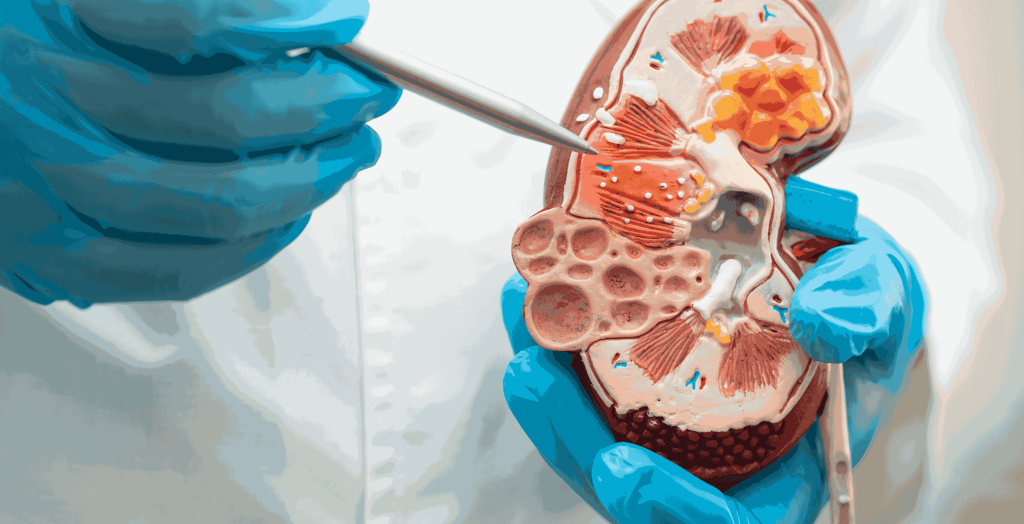Acute Renal Failure


Introduction
Acute Renal Failure (ARF), also known as Acute Kidney Injury (AKI), is a sudden loss of kidney function that occurs over a few hours or days. This condition results in the accumulation of waste products, electrolytes, and fluids in the body, which can be life threatening if not treated promptly. ARF can affect anyone, but it is particularly common in hospitalized patients and those with other serious health conditions.
Causes of Acute Renal Failure
The causes of ARF are typically categorized into three groups: prerenal, intrinsic (or intrarenal), and postrenal.
Prerenal Causes: These are conditions that reduce blood flow to the kidneys, such as:
Severe dehydration
Heart failure
Liver failure
Severe blood loss
Septic shock
Use of nonsteroidal antiinflammatory drugs (NSAIDs) or ACE inhibitors
Intrinsic Causes: These are direct injuries to the kidneys, which can result from:
Acute tubular necrosis (ATN)
Glomerulonephritis
Acute interstitial nephritis
Vasculitis
Toxins and medications (e.g., certain antibiotics, contrast dyes)
Postrenal Causes: These are obstructions in the urinary tract that prevent urine from leaving the kidneys, such as:
Kidney stones
Enlarged prostate
Tumors
Blood clots in the urinary tract
Symptoms of Acute Renal Failure
The symptoms of ARF can vary depending on the severity and underlying cause. Common symptoms include:
Kidney stones
Enlarged prostate
Tumors
Blood clots in the urinary tract
Decreased urine output (oliguria) or no urine output (anuria)
Swelling in legs, ankles, and around the eyes
Fatigue and weakness
Shortness of breath
Confusion and lethargy
Nausea and vomiting
Chest pain or pressure
Seizures or coma in severe cases
Diagnosis of Acute Renal Failure
Diagnosing ARF involves a combination of medical history, physical examination, and diagnostic tests:
Medical History and Physical Examination: The doctor will review the patient's medical history, symptoms, and perform a physical examination to look for signs of fluid retention and other abnormalities.
Blood Tests: These tests measure levels of waste products like creatinine and blood urea nitrogen (BUN), which are elevated in ARF.
Urine Tests: Analysis of urine can provide information about the underlying cause of ARF, such as the presence of protein, blood, or specific gravity.
Imaging Tests: Ultrasound, CT scans, or MRI can help identify obstructions or abnormalities in the kidneys and urinary tract.
Kidney Biopsy: In some cases, a small sample of kidney tissue is examined to determine the cause of kidney damage.
Treatment of Acute Renal Failure
The treatment of ARF focuses on addressing the underlying cause, managing symptoms, and preventing complications.
Key treatment approaches include:
Fluid Management: Intravenous fluids are administered to restore blood flow to the kidneys and correct electrolyte imbalances. In cases of fluid overload, diuretics may be used to remove excess fluid.
Medications: Depending on the cause, medications may be used to treat infections, control blood pressure, or reduce inflammation.
Dialysis: In severe cases, dialysis may be necessary to remove waste products and excess fluids from the blood when the kidneys are not functioning properly.
Nutritional Support: A tailored diet may be recommended to manage fluid and electrolyte balance and reduce the workload on the kidneys.
Monitoring and Supportive Care: Continuous monitoring of kidney function, vital signs, and electrolyte levels is crucial. Supportive care may include managing complications such as infections or heart problems.
Prevention of Acute Renal Failure
Preventing ARF involves reducing risk factors and maintaining kidney health:
Stay Hydrated: Adequate fluid intake helps maintain kidney function.
Monitor Medications: Use medications, especially NSAIDs and nephrotoxic drugs, under medical supervision.
Manage Chronic Conditions: Control conditions like diabetes, high blood pressure, and heart disease.
Avoid Toxins: Limit exposure to toxins, including certain medications and environmental chemicals.
Prompt Medical Attention: Seek medical care for conditions that may lead to ARF, such as infections or dehydration.
Conclusion
Acute Renal Failure is a serious condition that requires immediate medical attention. Understanding the causes, symptoms, and treatment options is essential for managing and preventing this potentially lifethreatening condition. Early diagnosis and appropriate treatment can significantly improve outcomes for patients with ARF.
Editorial History
Written By:
Nikita Kewalramani
Reviewed By:
Dr. Sachin Kadoo
MBBS, MD.
Last updated: July 30, 2024
References:
Bellomo, R., Kellum, J. A., & Ronco, C. (2012). Acute kidney injury. The Lancet, 380(9843), 756766. https://doi.org/10.1016/S01406736(11)614542
Chawla, L. S., Bellomo, R., Bihorac, A., Goldstein, S. L., Siew, E. D., Bagshaw, S. M., ... & Mehta, R. A. (2017). Acute kidney disease and renal recovery: consensus report of the Acute Disease Quality Initiative (ADQI) 16 Workgroup. Nature Reviews Nephrology, 13(4), 241257. https://doi.org/10.1038/nrneph.2017.2
Kellum, J. A., Lameire, N., & Aspelin, P. (2012). Kidney disease: Improving global outcomes (KDIGO) acute kidney injury work group. KDIGO clinical practice guideline for acute kidney injury. Kidney International Supplements, 2(1), 1138. https://doi.org/10.1038/kisup.2012.1
Mehta, R. L., Kellum, J. A., Shah, S. V., Molitoris, B. A., Ronco, C., Warnock, D. G., ... & Levin, A. (2007). Acute Kidney Injury Network: report of an initiative to improve outcomes in acute kidney injury. Critical Care, 11(2), R31. https://doi.org/10.1186/cc5713
